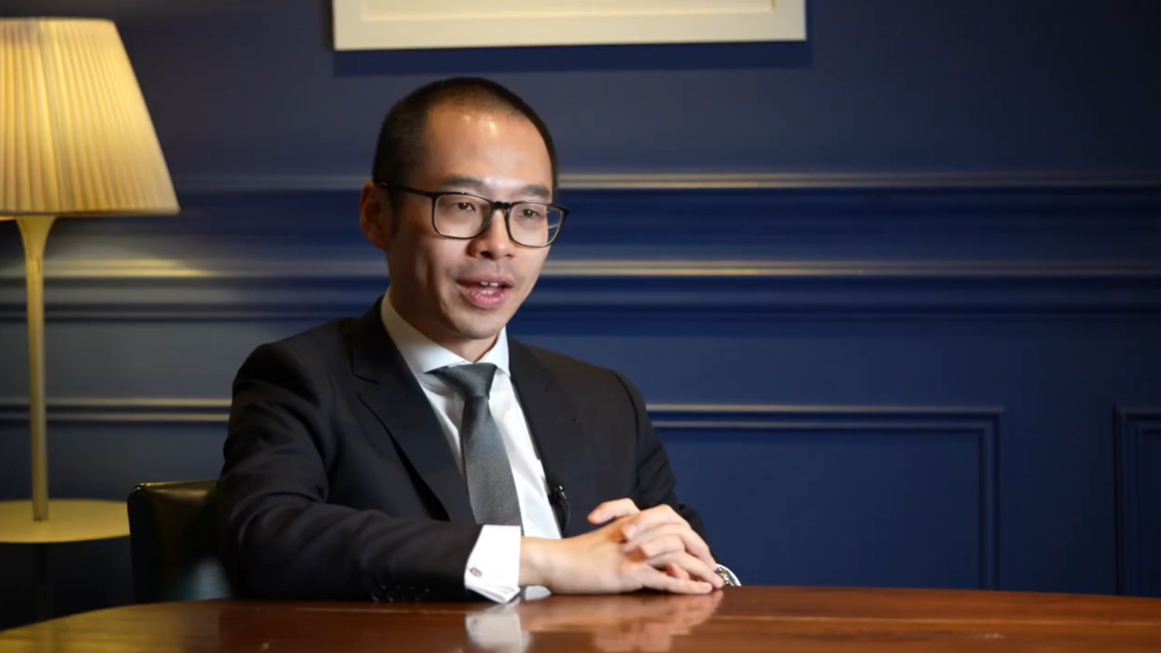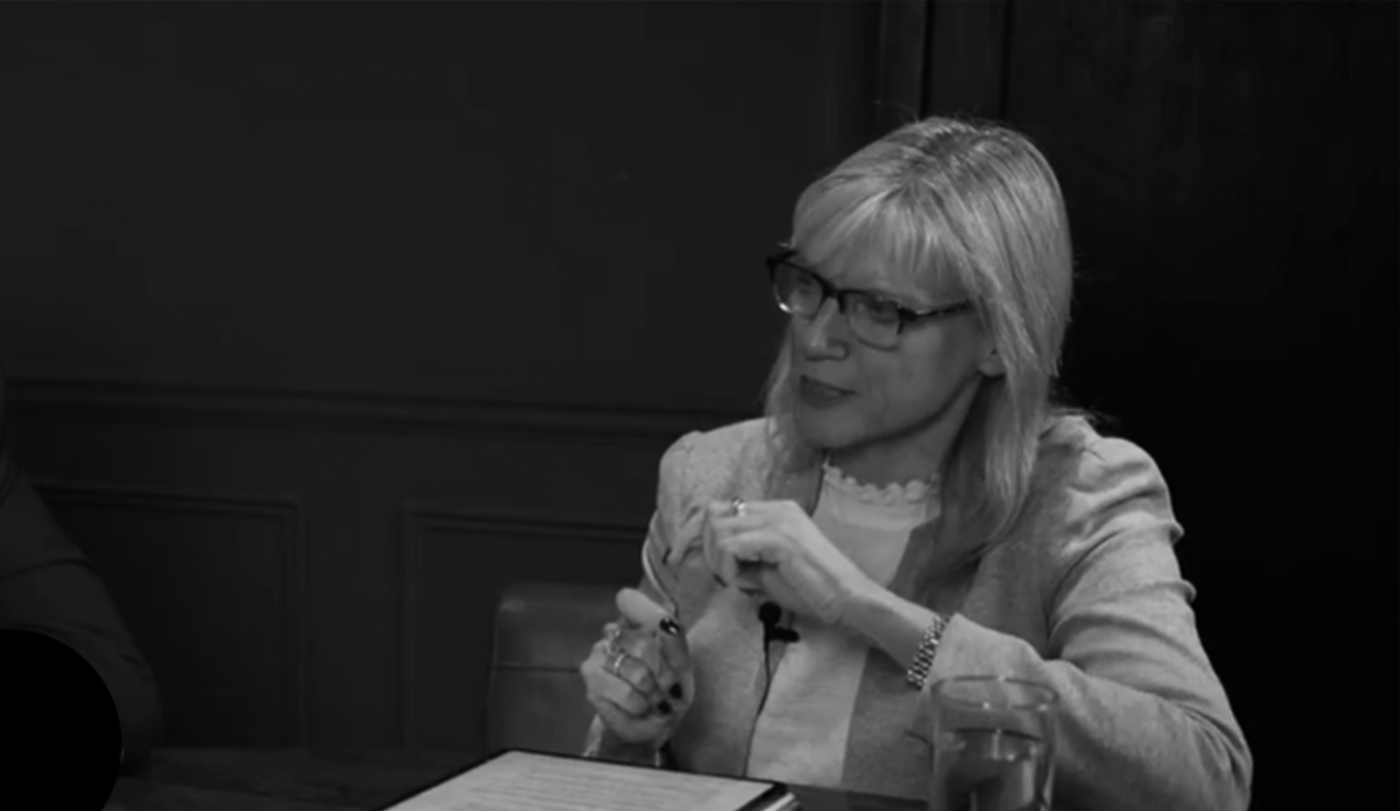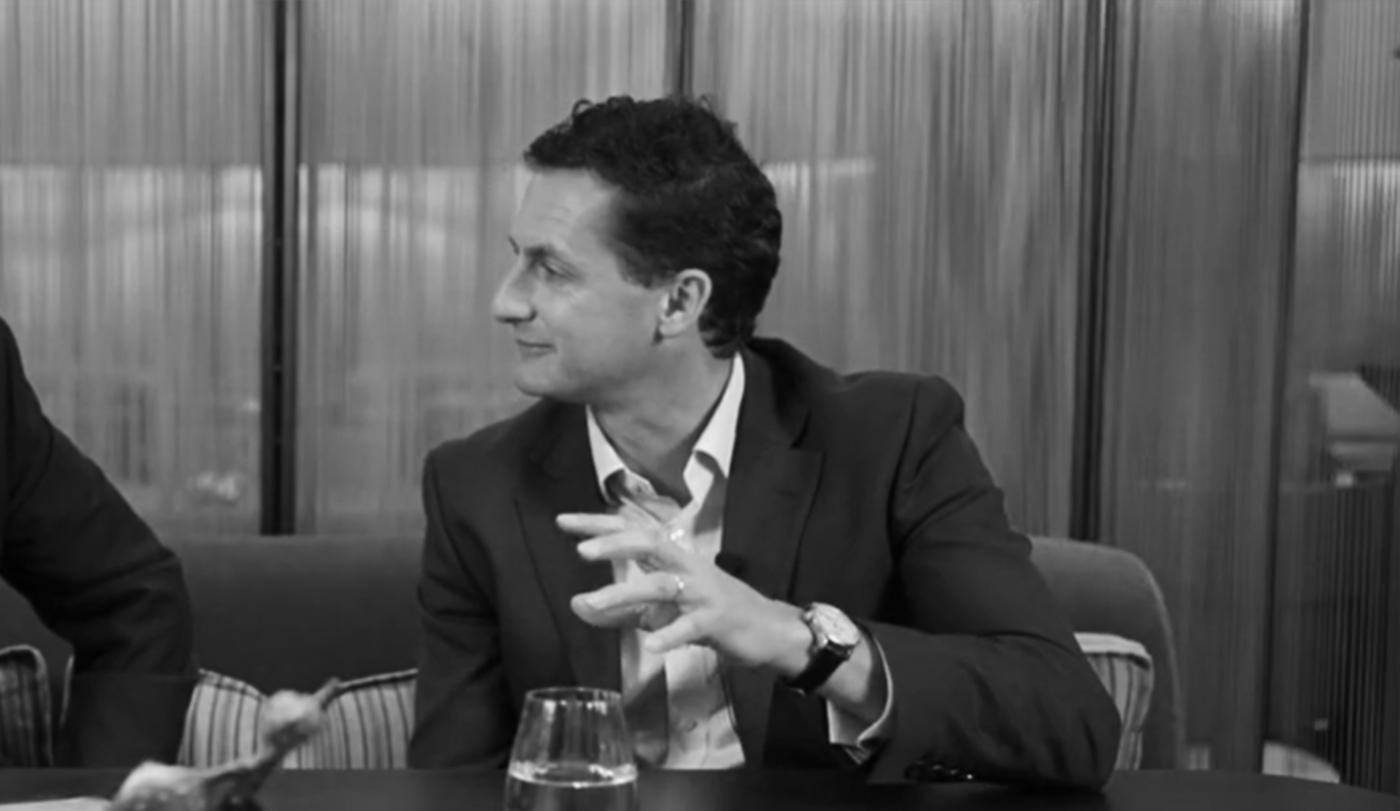On responsible investing tailwinds, real-world metrics and not being Neil Tennant
In our regular video series, we interview the wealth sector’s key decision-makers to discover how they think about life, both within the world of investment and beyond it; what brought them into the business and what keeps them here; and what makes them and their companies tick
“There may be a bit of ‘ESG fatigue’ in the market,” concedes Jake Moeller, associate director, responsible investment at Square Mile Investment Consulting and Research before, as you might reasonably expect from someone with that job title, quickly going on to assert: “But I still beat the drum on responsible investing.”
Talking with Wealthwise editorial director Julian Marr in the above video, he continues: “The reason I do that is because there are very fundamental changes in the way we are beginning to consume – often without people even realising. From emerging technologies and electric vehicles to the way we consume power and electricity and so on, there are a whole bunch of tailwinds that are driving potential returns for investors.”
While some investors in these areas may have had their fingers singed in the last couple of years, Moeller argues that does not mean “those opportunities are still not compelling”. “You have just got to be a bit more patient with the time horizon,” he counsels.
From emerging technologies and electric vehicles to the way we consume power and electricity and so on, there are a whole bunch of tailwinds that are driving potential returns for investors.”
“There are amazing developments in, for example, biotechnology, precision medicine and healthcare – all of these things are being supported by ageing demographics. And, at the same time, we have changed our consumption of, and demand for, energy. So, very exciting – and still very compelling – if you are prepared to have a close look at these investments.”
And possibly also if people are prepared to look past the contortions – linguistic or otherwise – that financial regulators in the UK and Europe have twisted themselves into in recent years. Does Moeller believe they are beginning to achieve a degree of consistency now?
“I think they are trying,” he replies carefully. “The thing with regulation is it is always fairly reactive, isn’t it? It is very difficult to future-proof regulation but, if you look at the FCA, they are doing a decent job of trying to put some meat on the bones of sustainability. And I think we will get there and I think ultimately investors will be able to see the support the regulators are offering and be a lot more comfortable with those sorts of investments. It just takes a bit of time to settle down.”
‘Real-world metrics’
Elsewhere in the conversation, Moeller highlights what he most looks for in an investment – and what may constitute a red flag. “I love consistency,” he says. “I look for fund managers who are able to see through the noise – through all those exciting trends and developments – and actually bring things back to real-world metrics, to real-world tangible cashflows and return on capital.
“Sometimes, in exuberant markets, even professional investors can forget about such things. I remember one fund manager talking about the amount of fibreoptic cable a company had in its inventories. People thought that was a measure of success – it wasn’t. You know, you have got to have profits, you have got to have revenues and you have got to have, more importantly, cashflows. That is a major issue.”
As for red flags, Moeller says: “That would be a fund manager leaving or a fund manager changing their stripes. If you remember, a few years ago, there was a trend for US equity fund managers to be replaced with generalists – and that, to me, was a red flag. Not all expertise is portable all the time.”
A full transcript of this episode can be found after this box while you can view the whole video by clicking on the picture above. To jump to a specific question, just click on the relevant timecode:
00.00: Introduction
00.40: What excites you about the current investment outlook? What worries you?
02.05: What do you most look for in an individual investment? What constitute ‘red flags’?
03.26: To what degree should professional investors be thinking beyond so-called ‘traditional’ investments? Towards what?
04.20: What does ‘ESG 2.0’ look like?
06.33: What drives your approach to client communications? Should professional investors aim to attract the ‘right’ type of client?
07.45: What was your path into investment – and, if you hadn’t taken it, what do you think you would be doing now?
08.44: What is the biggest investment mistake you are prepared to admit to – and what did you learn from it?
09.47: Outside of work, what is the strangest thing you have ever seen or done?
11.02: Two ‘Choice Words’ recommendations, please – one a book; one a free choice?
Transcript of ‘Choice Words’ Episode 5:
Square Mile’s Jake Moeller – with Julian Marr
Julian: Well, hello and welcome to the latest in our series of ‘Choice Words’ videos where we get to chat to key decision-makers in the world of fund selection and fund research. I am Julian Marr, editorial director of Wealthwise Media, and today I am delighted to be talking to Square Mile Investment Consulting and Research associate director – responsible investment, Jake Moeller. Hello, Jake – good to see you.
Jake: Pleasure to be here. Thank you for having me.
Julian: It is my absolute pleasure! Now, what I have learned from the first batch of ‘Choice Words’ videos we have recorded is I cannot have a short enough intro! So, straight to the first question – what excites you about the current investment outlook? And what worries you?
Jake: Everything that goes on is exciting in some respects.
Julian: Oh, this is going to be great then!
Jake: Well, I like to get excited about things! You know, you have seen what is going on with Nvidia, for example – and the great thing about our industry, Julian, as you well know, is it is very dynamic. Funds evolve – they come and go – but there is always something that is new. There is always some new technology that is coming to market – and some shake-outs, for sure – and Nvidia has shown that.
But there are some exciting things going on – for example, developments with electric vehicles, while this whole AI thing is really exciting. How do you make money out of it? Well, that is another question. But I think we are in a very exciting period of the planet’s history where technology has really changed the way we think about the kind of products we consume and how we consume them.
Julian: I hate to bring you down, then, but is there something that gives you pause for thought?
Jake: Yes – traditional metrics like interest rates always bother me. You know, interest rates are meant to be coming down and they are not coming down fast enough – and that scares companies, that scares investors, that scares managing directors. So I do have some concerns about the the fiscal environments and the monetary environments but, again, the key to overcoming those concerns is to not lose your head about the excitement and the new technologies. Just remember – some traditional metrics are always quite important.
Through the noise
Julian: Fair enough. Drilling down to individual investments, then, what is it that you most look for – and what would you consider to be a real red flag?
Jake: I love consistency. I look for fund managers who are able to see through the noise – those exciting trends and developments – and actually bring them back to real-world metrics, to real-world tangible cashflows and return on capital. Sometimes, in exuberant markets, even professional investors can forget about these things.
I remember one fund manager talking about the amount of fibreoptic cable a company had in its inventories. People thought that was a measure of success – it wasn’t. You know, you have got to have profits, you have got to have revenues and you have got to have, more importantly, cashflows. That is a major issue.
As for red flags, that would be a fund manager leaving or a fund manager changing their stripes. I don’t know if you remember but, a few years ago, there was a trend for US equity fund managers to be replaced with generalists – and that, to me, was a red flag. Equities specialties aren’t always portable and, when you look at regional variations and understanding your market, that would be a major flag.
Julian: So asset management groups understanding that what you are looking for is a building block – and you want that building block to remain square, or cubed, so you know exactly where you are with it?
Jake: Absolutely right. Not all expertise is portable all the time.
Julian: Cool. To what degree should professional investors now be looking beyond so-called ‘traditional’ investments – and is there anything particular you would flag in what we will call the alternative space, for want of a better phrase?
Jake: I am always a little bit reluctant to encourage investors to deviate from the tried and true. I am a traditionalist at heart – a bit like yourself! – and I tend to think it is easy to get distracted. Technology is great but, until something is proven to be generative with income – be very, very careful.
So I stick with ‘traditional’ alternative investments – you know, there are still ways to access property. Look at the discounts on Reits, for example, and they do actually help diversify your portfolio if you hold them for the medium term. Infrastructure is still reasonably liquid and is a good diversifier. Outside of that – just be careful. I don’t encourage investors to go too far off the beaten track.
Responsible investment tailwinds
Julian: OK – I am a bit nervous of my next question because it is on responsible … sustainable … ESG … impact … whatever you want to call it. And the main reason I am worried is because it took me about 17 takes to get your job title right at the beginning before I finally got ‘associate director – responsible investment’! Still, my question is – at the risk of being a smart Alec – what does ‘ESG 2.0’ look like?
Jake: Oh, I think it is a fair observation – I mean, there is a bit of ESG fatigue in the market but I still beat the drum on responsible investing. And the reason I do that is because there are very fundamental changes in the way we are beginning to consume – often without people even realising. I mentioned earlier technologies, electric vehicles, the way we consume power and electricity and so on – you know, there are a whole bunch of tailwinds that are driving potential returns.
Now, I think some investors in these investments have been hurt a little over the last couple of years but that doesn’t mean to say those opportunities are still not compelling – you have just got to be a bit more patient with the time horizon.
So I think there are amazing developments in, for example, biotechnology, precision medicine and healthcare – all of these things are being supported by ageing demographics. And, at the same time, we have changed our consumption of and demand for energy. So, very exciting and, I think, still very compelling, if you are prepared to have a close look at these investments.
Julian: And, possibly, if they are prepared also to look past the question of the vocabulary we use and the regulatory aspect as well. Do you feel the regulators are begin to achieve a degree of consistency now?
Jake: I think they are trying. You know, the thing with regulation is it is always fairly reactive, isn’t it? It is very difficult to future-proof regulation but, if you look at the FCA, they are doing a decent job of trying to put some meat on the bones of sustainability. And I think we’ll get there – I think we will – and I think ultimately investors will be able to see the support that the regulators are offering and be a lot more comfortable with those sorts of investments. It just takes a bit of time to settle down.
Clear, fair, not misleading
Julian: Thank you. I know client communication is important to you – you have very kindly written for various magazines of mine over the years – so what is the Square Mile approach to client communications? And, as a side question, should professional investors be looking to attract the right type of client from the start? Or should you be moulding and evolving the right type of client? And by ‘right type’, I mean people who are not going to just dive in and dive out at the wrong times and therefore miss out on returns.
Jake: Well, there’s only one answer to client communications, Julian – and that is they need to be clear, fair and not misleading, because that is what the FCA says! I think that is important, right? So you have to be clear, fair and not misleading – but also you have to avoid patronising your audience.
We have a varying degree of clients – some of my individual consulting clients are very sophisticated investors; some of them aren’t – but you have to be able to understand the kind of language they are speaking and try and explain things to them in a way they understand clearly.
So there is a delicate path to tread. Don’t patronise. Don’t use acronyms people don’t understand. Don’t assume they understand something you think is fundamental. You find common ground by talking to your client and then getting to know them – and that should encourage a fairly good dialogue.
Right and wrong notes
Julian: Good stuff. A more personal question now – or, indeed, two-part question as, apparently most of my questions are. What was your path into investment? And, more metaphysically, if you hadn’t taken it, what would you be doing now?
Jake: I graduated into the recession of 1994 with a degree that was, you know, punctuated by playing hockey and hanging out at the Student Union bar. So I worked my way up through being a pensions administrator – it was data-entry back, then with keypads.
I stuck with that for a couple of years and managed to get a job as a fund-of-fund manager for a pension fund – and it sort of came from there. Otherwise, I would have been a music teacher, which is something I am often haunted by – because I do love music very, very passionately. But it doesn’t pay the rent – unless you are Lang Lang or one of the other top pianists.
Julian: Well, always nice to have something to fall back on. Not connected to what I just said, what is the biggest investment mistake you are prepared to admit to? And did you learn anything from it?
Jake: In 2008, when I was managing funds of funds for life companies, I got a bit carried away with commercial property and I regret not pulling back on that exposure. I mean, no-one can see what is going to happen and 2008 was a very difficult time – but there were warning signs there, in retrospect, and I would have liked to have built a stronger underweight to the commercial property exposure I had in my funds.
I didn’t and I got stuck, I think, with the New Star fund at the time, which was one of the first ones to be suspended. So, yes, I’ve learned from that – and, you know, marking-to-market and understanding how liquidity works became a lot more important.
Julian: I like the phrase ‘Warning signs, in retrospect’ – a good book title for the future!
Jake: Yes – if I was famous enough to write an autobiography, that would be one to consider!
Left to his own devices
Julian: I know this is an odd a question – but, outside of work, what is the strangest thing you have ever seen or done?
Jake: OK – this is a sad but true story! I was on a research trip in New York, actually, with a bunch of fellow fund selectors, and someone had piped up earlier in the day that I looked a bit like Neil Tennant from the Pet Shop Boys. The maître d’ of the restaurant came over and asked us what we were all celebrating as a group – and one of the other people said, Oh, it’s the Pet Shop Boys celebrating the new album.
A few minutes later, the maître d’ came out with a napkin and said, Oh, Neil, can you please sign this napkin? So I wrote on it, ‘Sometimes you’re better off dead’ – which is the first line of ‘West End Girls’ – and then ‘Lots of love, Neil’. And it pains me to think that that napkin might be framed and on the wall of that seafood restaurant in Manhattan – and even worse, if Neil Tennant actually sees it!
Julian: Well, I understand he is a keen follower of this ‘Choice Words’ series – and of Wealthwise as a whole.
Jake: I don’t think I look like Neil Tennant, by the way!
Julian: Well, I didn’t want to derail your story! Shouting, Oh no, you don’t – that’s not what interviewers do! Brilliant. Last question – this series is called ‘Choice Words’ so let’s get some personal choices from you. Not funds, but just recommendations – ideally, one book and the other one is a free choice. It can be a restaurant – not necessarily in Manhattan. It can be an album – not necessarily by the Pet Shop Boys.
Jake: Well, actually any Pet Shop Boys album you like –though ‘Introspective’ from 1988 would be my tip. A fantastic album. Nicholas Montserrat’s The Cruel Sea is one of my favourite-ever books – and, if you are ever looking for a good war adventure, that is probably the one for me.
Julian: So you are offering the Pet Shop Boys’ ‘Introspective’ as your other recommendation?
Jake: Well, ‘Left To My Own Devices’ is a fabulous song.
Julian: Fair enough. Well, great ‘Choice Words’ choices – and I really need to stop using that as wind-up phrase because it is not easy to say. But Jake, thank you so much for coming in today.
Jake: Pleasure to be here.
Julian: Thank you – and thank you so much for watching.
Please do look out for further Choice Words episodes as they are published








